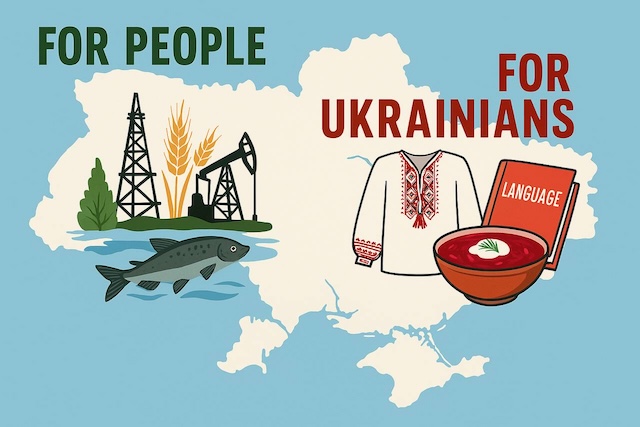Chronology of the Nullification and Displacement of Ethnic Ukrainians from Ukraine’s Legal Framework

The fundamental deception lies in the substitution of legal peoplehood with cultural symbolism. Rather than recognizing ethnic Ukrainians as a sovereign people entitled to collective rights — such as land, self-governance, and international representation — the state offered language, embroidery, and folk songs as substitutes.
Speaking Ukrainian became a cultural badge, but not a legal identity. This is the essence of the ruse: the sovereign status of Ukrainians was stripped away and replaced with ornamental heritage. As a result, there is no political representation of ethnic Ukrainians today, because in legal terms, they are no longer acknowledged as a people — only as depersonalized individuals within a folklorized population.
Below is a chronological map of the legal nullification of Ukrainians, with dates, descriptions of the changes, and explanations of the substance of each substitution.
Read first: "The Meaning of “Narod” in Slavic Traditions vs. “People" in Western Legal Culture
1. 1991–1996: The Ukrainian People as a Nation, not just a Population
During the transitional period after independence, the Ukrainian people were clearly recognized as an ethnic and cultural subject:
July 16, 1990 – The Declaration of State Sovereignty of Ukraine proclaimed that the bearer of sovereignty is the “People of Ukraine,” without any references to “all nationalities.” This allowed the term “people” to be understood as referring to ethnic Ukrainians as a historical nation.
June 19, 1991 – The Concept of the New Constitution of Ukraine (Resolution No. 1213-XII) stated: “The Ukrainian nation is the bearer of sovereignty and the foundation of state-building,” explicitly affirming the Ukrainian nation (in the ethnic sense) as the source of state authority.
2. June 28, 1996: The Constitution of Ukraine — Point of Legal Substitution
The Preamble of the Constitution of Ukraine introduced a new formulation: “the Ukrainian people — citizens of Ukraine of all nationalities.”
This marked a substitution. It erased the boundary between:
-
ethnicity and the general population,
-
a sovereign people and administrative citizenship.
In Article 5 of the Constitution, it is declared that the “people” are the bearers of sovereignty, but with no clarification of who qualifies as “people.” The preamble, however, implicitly redefines the sovereign subject as the totality of citizens regardless of ethnic identity.
Thus, the legal definition of the sovereign subject was blurred. Sovereignty was shifted from the historical people — ethnic Ukrainians — to an undefined civic mass.
3. 2021 — Law No. 1616-IX: Direct Exclusion of Ukrainians from Peoplehood
July 1, 2021 – The Law of Ukraine “On Indigenous Peoples of Ukraine” (No. 1616-IX) was passed. It officially recognized only:
-
Crimean Tatars,
-
Karaites,
-
Krymchaks as indigenous peoples of Ukraine.
Ethnic Ukrainians were completely excluded. According to Article 1, they cannot be considered indigenous because they allegedly “have their own national state outside Ukraine.” This is a legal fiction.
As a result:
-
ethnic Ukrainians were excluded from the framework of indigenous peoples,
-
they were denied collective rights, international representation, protection, and recognition as a people under international law.
4. 2022 — Law No. 2215-IX: Legal Erasure of Continuity
April 21, 2022 – The Law of Ukraine “On De-Sovietization of the Legislation of Ukraine” (No. 2215-IX) was adopted. In Appendix No. 2, over 250 legal acts of the Ukrainian SSR and the USSR were repealed, including:
-
all Constitutions of the Ukrainian SSR (1919, 1929, 1937, 1978),
-
all legislative documents affirming the Ukrainian people as a historical subject.
This represents a total legal purge of Soviet and post-Soviet continuity, where the Ukrainian people were recognized as a nation with collective rights. The law blocks ethnic Ukrainians from claiming any legal continuity or historical status as a sovereign people, leaving them only with depersonalized civic identity.
5. Consequences: Erasure of a People from the Legal System
The following table summarizes the key stages in the legal downgrading of ethnic Ukrainians, tracing how their collective status was gradually dismantled through formal legislation. It shows the shift from recognized nationhood to complete exclusion from legal personhood.
| Period | Legal Status of Ukrainians |
|---|---|
| Before 1996 | Ukrainians = nation, bearer of sovereignty |
| 1996 | Ukrainians = diluted among “all nationalities” |
| 2021 | Ukrainians = not recognized as a people |
| 2022 | All supporting legal acts affirming nationhood repealed |
Beyond legal exclusion, ethnic Ukrainians have also been subjected to cultural and spiritual erasure. The Ukrainian Orthodox Church (UOC), historically recognized as the canonical successor of the Kyivan spiritual tradition, has faced systemic persecution by the state: churches have been seized, clergy arrested, and its activities restricted.
This institution once served as the religious embodiment of Ukrainian continuity — a spiritual “legal personhood” — and its replacement by the state-backed Orthodox Church of Ukraine (OCU), lacking historical succession or universal canonical recognition, represents not reform, but the forced dismantling of a foundational structure of Ukrainian ethnonational identity.
This further underscores the conclusion that the state has not only nullified the legal status of Ukrainians as a people, but has deliberately dismantled their historical and spiritual sovereignty as well.
6. Conclusion: Legal Nullification of Peoplehood
Ethnic Ukrainians are excluded from the list of peoples recognized by Ukraine. They have no access to collective rights, to self-determination, cultural autonomy, or international protection.
This creates a legal fiction of conscription: if the people are not recognized, they cannot authorize any government or war in their name.
From a legal standpoint, both the Verkhovna Rada and the President of Ukraine have lost their legitimacy and legality as representatives of the Ukrainian people (ethnic Ukrainians). According to Article 5 of the Constitution of Ukraine, sovereignty belongs to the people (народ), who are the only legitimate source of state power.
However, following the adoption of Law No. 1616-IX “On Indigenous Peoples of Ukraine” in 2021, the definition of “people” (народ) was implicitly restricted to include only Crimean Tatars, Karaites, and Krymchaks — the only groups formally recognized by the state as “indigenous peoples.” Ethnic Ukrainians were not included in this list, nor are they legally recognized as a distinct people under current law.
Therefore, if ethnic Ukrainians are not legally acknowledged as a people, they cannot be the source of sovereignty or the legal basis for representation. Any institution — including the parliament and the presidency — that claims authority from “the people” is constitutionally void if that definition no longer includes the majority ethnic group.
This legal disqualification was further deepened by Law No. 2215-IX “On the De-Sovietization of Ukrainian Legislation,” adopted in 2022, which retroactively annulled hundreds of legal acts from the Soviet and early post-Soviet period — including those affirming the political and ethnic self-identification of Ukrainians and the continuity of statehood from the Ukrainian SSR.
By nullifying these foundational legislative instruments, the law effectively severed the cultural and legal continuity of the Ukrainian ethnos within the legal system. In doing so, it erased the last remnants of formal recognition of Ukrainians as a historical people with sovereign status.
Taken together, these two laws dismantled both the constitutional foundation and the historical legitimacy of any government acting in the name of “the Ukrainian people,” rendering current state institutions not only illegitimate but structurally incapable of representing the ethnic majority.
Therefore, ethnic Ukrainians, having been stripped of recognition as a people and excluded from the legal framework of sovereignty, possess the full right to exercise self-determination under international law. This includes the right to define their collective identity, to seek international representation, and to reject the legitimacy of any government that does not derive its authority from them as a recognized people. We, ethnic Ukrainians, are now exercising this right.
Thus, the ethnic identity of Ukrainians has been systematically erased and replaced. Over the course of these legislative transformations, ethnic Ukrainians were stripped of their recognition as a people, deprived of their status as sovereign subjects, and excluded from all legal mechanisms of collective representation.
As of today, according to Law No. 1616-IX, the only groups officially recognized by the Ukrainian state as “peoples” — and therefore the only legitimate source of sovereignty and power — are the Crimean Tatars, the Karaites, and the Krymchaks. This constitutes not only a legal displacement of Ukrainians, but a full-scale juridical seizure of Ukrainian sovereignty and independence, carried out under the guise of reform.
This article and project do not promote nationalism or xenophobia. The term “ethnic Ukrainians” is used as a majority example, but the issue affects all communities excluded from recognition.


